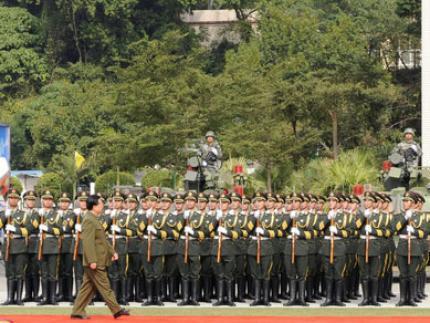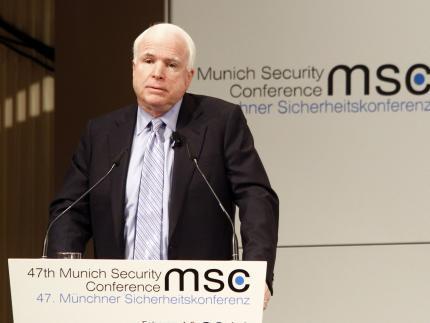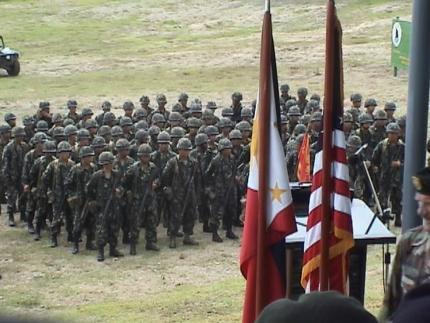Gordon G. Chang's Blog, page 28
February 15, 2012
Power Struggle in China

The attempted defection of Wang Lijun, recently the top cop in the western city of Chongqing, suggests that China's ongoing leadership transition will be especially turbulent.
On the 6th of this month, Wang entered the American consulate in Chengdu, the capital of neighboring Sichuan Province, seeking asylum. He spent a day there. Incredibly, his old boss, Chongqing Party Secretary Bo Xilai, essentially invaded Sichuan by sending hundreds of his armed security troops to surround the Chengdu consulate in an unsuccessful bid to apprehend Wang.
It's no surprise that Bo wanted to grab hold of his onetime trusted assistant. Wang evidently was willing to turn over sensitive documents about Bo or his wife, and that looked like it would mean the end of his career. The charismatic Bo has not hidden his desire for a seat on the Communist Party's Politburo Standing Committee, the apex of political power in China. According to the State Department, Wang left the consulate grounds "of his own volition." He is now believed to be in the custody of state security officials in Beijing after Washington evidently turned down his asylum request.
Why did Wang try to defect? The rumor mills in China are working overtime, but it's a fact that Wang is famous for arresting about 6,000 triad gangsters, corrupt officials, and others at the behest of Bo. Wang's tough law enforcement, along with Bo's political maneuverings, threatened, among others, senior Beijing leaders. Some are even whispering that Hu Jintao, China's current top leader, engineered the extraordinary events of last week. If that is true, then Xi Jinping, supposedly China's next supremo, may be vulnerable, as he is believed to be more closely aligned to Bo than to Hu.
In the fall, China's political transition formally begins at the 18th Communist Party Congress, when the Fourth Generation leaders, led by Hu, are slated to give way to the Fifth. A week ago, every China watcher would have told you that Xi would definitely head the new generation and that the transition would be "smooth." Now, the handover might well be marked by uncertainty and turbulence instead.
In fact, the Wang incident indicates that factionalism, evident in recent years, is worse than most observers thought. As the Communist Party tries to downplay ideology, its members are drifting into coalitions and finding something new to fight about. Bo is member of the "Princelings," a group comprising offspring of party leaders, and Hu Jintao a part of the Communist Youth League group. Xi is considered a member of the former grouping but has ties across several factions, including the Shanghai Gang. Last week's unexpected events, when factional infighting became visible in public, indicate that these groups have yet to agree on the Fifth Generation leadership lineup.
We should not be surprised at the internal squabbling as this is the first handover of power in the history of the People's Republic not masterminded by Deng Xiaoping. Deng, after making quick work of Mao's designated successor, picked Jiang Zemin to succeed himself and Hu to follow Jiang. Now, there is factional discord in large part because there are no elders of the stature of Deng to settle matters among the overly ambitious corp of contenders for power.
After Wang Lijun was whisked away to Beijing, it appeared to most observers that Bo's career would end soon. Yet he is refusing to give up and is reportedly seeking the help of certain generals. This may be a winning tactic. After all, the military looks like it has become the most influential bloc in the Communist Party, in part because it has remained relatively cohesive while civilian leaders have fought among themselves.
The rise of the military—really, the partial remilitariziation of politics and policy—and factional splintering is resulting in a change in the nature of the regime. As this process of change continues, we can only wonder what happens next.
February 7, 2012
McCain to Beijing: Revolution is Coming

"The Arab Spring is coming to China," John McCain told Chinese Vice Foreign Minister Zhang Zhijun at the just-concluded Munich Security Conference, sometimes called the "Davos of Defense."
Zhang, according to People's Daily, shot back that the senator's comment was "no more than fantasy." The Chinese government has support of more than 70 percent of the people, the Beijing diplomat noted, citing a survey conducted by a Western organization he did not identify.
People's Daily, the Communist Party's flagship newspaper, said in its Chinese-language edition that the confrontation was "full of gunpowder smell." Chinese leaders have traditionally used gunpowder references as code for insidious foreign attempts to undermine China's socialist system.
Why should Beijing care so much about the Arizona senator? China's one-party system looks increasingly fragile, as protests grow in number and become more violent. So when People's Daily went after McCain for mirroring America's "anxiety and lack of confidence," the counterattack betrayed Beijing's own fears. As Hong Kong's South China Morning Post noted, the party newspaper rarely reports specific criticisms by foreigners in public settings.
Yet the response to McCain, most revealingly, extended far beyond issues of social stability to matters the Arizona Republican could not be held responsible for. In an English-language article about his Arab Spring comment, People's Daily rhetorically asked why China was not "freaking out" when faced with the new American "reset" policy of the Obama administration, the so-called "pivot" of American strategic focus to East Asia. "The answer is simple: China understands the danger of confronting the current global order, it should cautiously and rationally deal with various challenges to pave the way for development," the paper noted. "China, as the implicit target of the strategy, is responding with reserve."
If Beijing has reacted with restraint to the White House's renewed focus on China, it is only because it has yet to figure out what to do. It could take months more for Chinese officials to craft their response, yet in the broad-based attack on John McCain we can see that, in their mind, they are developing the notion that unrelated events are in fact linking to create a web—a global conspiracy—to entrap them and destroy their system. In fact, one of the many Chinese-language commentaries in People's Daily said that McCain was actually hoping for turmoil in China.
McCain is not a co-conspirator plotting the next Chinese revolution. Moreover, he has nothing to do with Obama's much-discussed "pivot." The fact that Beijing can't stop talking about it suggests the White House has, with its new policy, struck a nerve.
And so has Senator McCain.
Photo Credit: Sebastian Zwez
January 31, 2012
Beijing Targets the Philippines

On Sunday, Beijing launched an apparently coordinated campaign to intimidate the Philippine government, which has recently moved to increase defense cooperation with the US.
In recent days, Manila revealed that American reconnaissance planes and warships are planning to rotate through Philippine bases and that the Pentagon is discussing the sale of equipment and the provision of additional training. Philippine and US marines will practice defending and retaking oil rigs in the disputed South China Sea. In March, the two countries will be holding further defense talks.
Why is Manila reversing two decades of cool relations with the United States? Beijing claims as its own the entire South China Sea and virtually all the islands in it, and this expansive notion puts Beijing into conflict with countries, like the Philippines, that have historically occupied islands close to their shores. Aggressive Chinese moves in the area have driven such nations to seek Washington's help in the past three years.
"Without a deterrent force, we can be easily pushed around," said Philippine Defense Secretary Voltaire Gazmin on Friday, after two days of talks in Washington. "Our territories will be violated. Now that we have a good neighbor on the block, we can no longer be bullied."
The Chinese evidently think otherwise. "We hope that relevant parties will make more effort towards peace and stability in the region," the Chinese Foreign Ministry said in a statement faxed to AFP. The mild words, issued on Sunday, have to be seen in the context of a barrage of belligerent comments from Chinese state media.
On Sunday, the Global Times, owned by the official People's Daily, ran a hostile article titled "Make Philippines Pay for Balancing Act." Beijing, the paper wrote, "will not accept a small country in the region creating military tensions by playing a balancing strategy. A price should be paid for violating this principle. The Philippines will not be an exception."
And what is the price? "Well-measured sanctions against the Philippines will make it ponder the choice of losing a friend such as China and being a vain partner with the US."
Then the official China Daily chimed in on Monday by running an extraordinary piece threatening a downward spiral in Sino-American ties. Paraphrasing Wang Junsheng of the Chinese Academy of Social Sciences, the paper wrote that enhanced defense cooperation between America and the Philippines "sends a very dangerous signal that could cause China to misjudge the US' intentions, and raise suspicions between the two countries."
Earlier this month, Shi Yinhong of Renmin University stated that Beijing would go after the Philippines because it was, among the nations bordering the South China Sea, "the most active and critical country in trying to gain US support over the past year." As the Global Times said, Beijing, to protect its claims, had to "single out a few cases and apply due punishment."
The paper specifically urged Beijing to use economic leverage to cut ties between Manila and the nine other countries of the Association of Southeast Asian Nations, and if there was any doubt that this was just the opinion of one state-run paper, Shi, who Beijing often uses as a mouthpiece, had suggested the same thing in an interview with Hong Kong's South China Morning Post. "I think our peaceful means will win support from Southeast Asian friends," he said, "and isolate the Philippines."
But the other nations in Southeast Asia are also lining up against Beijing because China claims their islands too. So Shi's prediction reveals how much Beijing is out of touch with sentiment throughout the region, and this misperception is an indication of why things could go terribly wrong in the South China Sea this year.
January 25, 2012
Is Obama Getting Serious about China Trade?

"I will not stand by when our competitors don't play by the rules," said President Obama in his State of the Union message on Tuesday. And to make sure other nations comply with their obligations, he announced the creation of the "Trade Enforcement Unit." According to the Wall Street Journal, the new grouping will be a task force combining officials from the Treasury, Commerce, and Energy Departments as well as the US Trade Representative's office. Despite the generic name, the target of the Trade Enforcement Unit is China.
China may have racked up as much as a $300 billion trade surplus against America last year; if it failed to achieve that record-smashing mark, it was only billion or two short. In any event, it will surely surpass its 2010 surplus against the US of $273.1 billion. The 2010 deficit with China is the largest single-country one in the history of the United States.
If there were any time for the White House to get serious about Beijing's predatory trade policies, this is it. Clearly, China's surpluses are not sustainable, especially in a period of deteriorating economic conditions. Last Wednesday, the World Bank downgraded its global growth estimate by a full percentage point to 2.5 percent.
The president is right to highlight the China issue, and perhaps his organizational approach will result in more effective policies. Ted Alden of the Council on Foreign Relations, in comments carried in the January 12th Nelson Report, correctly called the task force proposal "the most comprehensive effort by any administration to rethink approaches to trade enforcement since the creation of the WTO."
Yet that is not saying much. The Clinton administration made a strategic mistake by agreeing to China's admission into the global trade organization before it was ready to abide by international standards, and the Bush team inexplicably allowed Beijing to continually game the system after the country's accession in 2001. The common element of the policies of the two presidents is the belief that Washington must work cooperatively with the Chinese.
President Obama, despite the trade actions he has launched against China, still shares this view. For instance, Treasury Secretary Timothy Geithner apparently discussed the task force proposal with Chinese officials during his visit there this month.
Yet the effort to maintain this dialogue appears misguided, as this patient "engagement" approach is what contributed to our problems in the first place, by giving the Chinese more time to engage in delaying tactics while racking up trade surpluses. As Alan Tonelson of the US Business & Industry Council wrote this month, "Ever since he endorsed the 2008 version of the Senate currency bill early in his first White House run, President Obama has had all the evidence of Chinese economic transgressions he could possibly want to justify strong retaliatory actions." And, as Tonelson also points out, the president already has the legal tools to enforce China's trade obligations.
One does not need to believe that Obama's task force is a ploy—"Will anyone be fooled?" Tonelson asked—to understand that the US will not make progress until Washington realizes it must move beyond "dialogue." After decades of broken Chinese trade promises, we should realize that the only thing that will work going forward is the full use of our economic leverage.
And what would that leverage be? With the collapse of European orders for Chinese goods last year, America has become an even more important market for China. President Obama has the bargaining power. The question now is, does he have the will to use it?
Gordon G. Chang's Blog
- Gordon G. Chang's profile
- 52 followers



